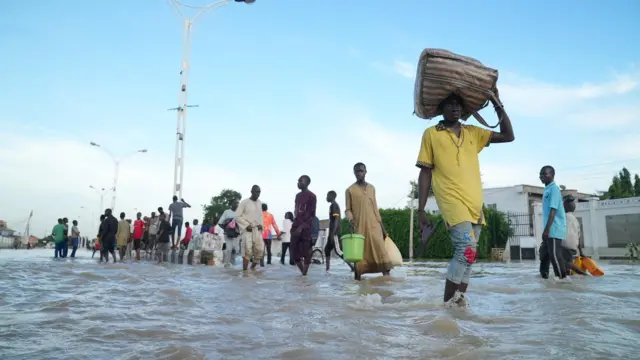Nigeria News
Flood Victims: Experts Speak On Trauma, Nutrition Crises, Proffer Solutions

Many Nigerian states have been hit by floods, including Borno State, Kebbi State, Niger State and others.
The Nigerian Meteorological Agency (NiMet), on September 19, said Borno, most of Adamawa, Taraba, Benue, Nasarawa, Kogi, Edo, Delta, Anambra, Bayelsa, Cross River, and Rivers states, are at high risk of flooding.
According to the Governor of Borno State, Babagana Zulum, over 1 million persons were affected by the Alau Dam flooding.
Naija News also reported that 30 persons died while 414,000 residents were displaced, with billions worth of property destroyed, in the Borno incident.
For Kebbi, the head of the National Emergency Management Agency (NEMA), Sokoto Office, Aliyu Shehu-Kafindagi, said the flood left no fewer than 2,000 people homeless, many injured.
“Ten communities were affected in Shanga local government, and they include, Kunda, Dala- Maidawa, Dala-Tudu, Dala-Mairuwa, Ishe-Mairuwa, Kwarkusa, Kurmudi, Tugar Maigani, Tukur Cika, Uguwar Gwada, Uguwar Wakili and Gundu.
“The incident, which occurred between September 17 and 22, was caused by heavy rainfall and coming of more water from River Niger, that led some communities to be submerged and inundated by the water,” Shehu-Kafindagi said.
Floods come with disease and infections, with long-term effects in most cases. “There are innumerable infections/diseases that can be as a result of flooding. For instance, the waterborne diseases of which cholera is a good example. Malaria is also a very common one,” a medical doctor, Iperepolu Olajumoke Praise told our reporter.
Aside from diseases and infections, victims suffer from the trauma of losing everything they worked for over the years and the trauma of losing loved ones.
A British Chartered Psychologist, Dr. Sanjay Popat, told our reporter that flood causes serious trauma to victims, stating that the victims need psychological support.
“Even if no particular mental health condition occurs, displacement can tear apart the network of communities, which are often key resources for these individuals in hard times. This can lead to cycles of isolation, and a disruption in daily routine – potentially leading to issues with one’s sense of self and identity.
“Examples may include developing post traumatic stress disorder, or depression, especially if those displaced witnessed destruction or loss of a loved one. The uncertainty may also heighten anxiety of those affected as worries about safety, security, and the future become central,” he said.
What can be done? Dr. Popat noted the need for mental health education for the flood victims in the IDP camps and a follow-up even when they leave the IDP camps.
Popat continued, “The government can play a key role in managing the mental health of those affected. This may include deploying trained psychological professionals to affected areas to offer immediate support, and telehealth services.
“They may also facilitate community support groups, allowing those affected to gather and share experiences and emotions, which the research shows can buffer the stress experienced.
“The government can also run campaigns surrounding mental health to educate those affected on how to care for their mental health. This campaign should also focus on the importance of asking for health, reducing the stigma of mental health.”
Another cause of worry is nutrition. Since most flood victims are taken to Internally Displaced Persons (IDPs) camps, they are made to eat whatever is presented.
A Maternal and Child Nutritionist, Ngozi Okoye-Okafor, told our reporter that nutrition quality should be treated as a priority for flood victims, particularly, nursing mothers.
“Food relief packages and clean water should be the first priority. We don’t also want the mother being ill as a result of drinking contaminated water to add to the mix,” the nutrition specialist said.
The former Supervisory Community Case Manager for an NGO in Enugu, Twinning for Health Support Initiative Nigeria explained, “The nursing mothers have to eat well enough to be able to have a good supply for milk for those with infants below 6 months and for those who have older children like 6 months and above.”
“Also for kids above 6 months, RUTF (Ready to use therapeutic food) should also be handed over to the kids to help supplement with breast milk.
“Dried fruits, milk, nuts, bread, things that do not require cooking should be prioritized. These are nutrient dense and can atleast for now close the gaps while the government keeps with the effort to address the issue of the flood,” she advised.
The UK-based Maternal and Child Nutritionist emphasized the need for government to deploy health workers, particularly, nutritionists, to educate the flood victims on how they can thrive after leaving the camps.
She, however, advised flood victims, when they leave camps, to eat more of “nutrient dense foods such as grains, nuts, legumes and fruits in season. Make sure children and themselves are getting enough protein from available lifestock such as fishes, crayfish, eggs.”












